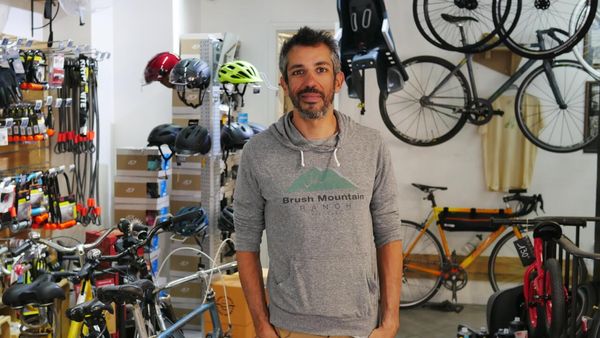The complexities of the human brain have perplexed drugmakers for years, but a slew of recent developments confirmed what investors in biotech stocks already knew: The neuroscience renaissance is here.
In years past, companies would try in fits and starts to develop treatments for various neurological disorders, only to be frustrated by the results. But now a host of biotechs are jumping into this realm, emboldened by newfound promise in Alzheimer's disease treatments and a landmark approval for a drug that takes on Lou Gehrig's disease.
Experts agree it's a period of revival and vigorous activity in neuroscience. And if there's one sentiment among the companies involved, it's the more the merrier.
Amylyx Pharmaceuticals just won Food and Drug Administration approval for Relyvrio, a treatment for amyotrophic lateral sclerosis, or ALS. Also known as Lou Gehrig's disease, the muscular condition is progressive and nearly always fatal. Meanwhile, Biogen recently shocked Wall Street with promising results in Alzheimer's disease. Like Amylyx's approval, Biogen's single Phase 3 study could be enough to prompt a rapid approval and boost Biogen stock.
Amylyx co-founder Justin Klee says neuroscience is at an inflection point. The FDA is exhibiting the flexibility needed to put forth rampant approvals for drugs to treat serious, unmet needs. This is helping investors funnel new money into brain-focused biotech stocks.
In many ways, the neurology field is at the same place oncology (cancer) was 20 years ago, Klee says. But there's a lot to do.
"We desperately need new treatments," Klee told Investor's Business Daily. "Combination treatment will be the ultimate answer. We need as many people, as many companies in this fight as possible to achieve successes like we've seen in oncology."
Biotech Stocks: Turning The Tables On Neurology
Klee isn't the only one to make the comparison between oncology and neuroscience drug development.
Decades ago, cancer treatment primarily relied on a three-pronged approach of surgery, chemotherapy and radiation. Today, the field includes drugs that manipulate the immune system, targeted treatments that take advantage of genetic mutations and meds that can be described as tumor-seeking torpedoes.
Getting there in cancer required acknowledging the serious unmet need for some patients. The FDA also embraced a flexible approach to the study designs and biomarkers it would consider for approval. The latter, however, presents some unique challenges in neurology.
"Neuroscience has for some time been thought to be the 'new' oncology, meaning yes, a growth area for investors," Mizuho Securities analyst Salim Syed said in an email. "The problem has been, however, that it's generally an inherently riskier area with more subjective (goals) and perhaps tougher biological pathways that we don't fully yet understand; we've also had some failures over the years."
Still, there's plenty of cash up for grabs for companies and the biotech stock investors who bet on them.
Last year, the neuroscience drug market was worth $32.2 billion, according to research firm Imarc Group. They expect it to reach $41.2 billion by 2027. Custom Market Insights sees a smaller market, but similar growth. It estimates the market for neuroscience drugs was worth $26.2 billion last year and will reach $38.8 billion by 2030.
The variance in estimates likely depends on near-term progress in the neurology field.
Steady Cadence Of Good News
No one can argue the recent cadence of news in neurology has been positive for such issues as Biogen stock.
In September, Biogen said its Eisai-partnered drug, lecanemab, led to a 27% slower cognitive decline for patients with mild Alzheimer's disease. Biogen stock soared nearly 40% in a single day.
For Biogen stock, lecanemab represents a second chance at an Alzheimer's approval. Biogen also won an accelerated approval for a similar drug, Aduhelm. Both Aduhelm and lecanemab remove built-up plaque in the brain known as amyloid.
However, experts don't agree on whether amyloid causes Alzheimer's or is merely a result of the disease. Recently, an amyloid-targeting Alzheimer's drug from Roche failed in two Phase 3 studies.
The Centers for Medicare and Medicaid Services took a conservative stance on the issue, opting against reimbursing for Aduhelm use unless patients were enrolled in a study to confirm Aduhelm's benefit — a contingency of the accelerated approval.
As a result, Biogen de-emphasized its Aduhelm efforts, and Biogen stock fell.
Flipping The Alzheimer'sScript
But Biogen recently flipped the script.
"Lecanemab was a big encouragement for the whole space and community as well," Amylyx co-founder Joshua Cohen told IBD. "Investors and the community often look for trends and patterns, and I do think we're starting to have some good news stories coming out at a more frequent cadence — particularly in diseases like ALS and Alzheimer's which have historically been impossible or incredibly difficult."
Amylyx can count itself as part of the good news parade. The company gained FDA approval for Relyvrio in ALS patients in late September. The biotech stock hit a recent low in early September, but ramped up heading into its FDA review date. Since then, shares have surged 130% as of the close on Oct. 28.
Bullishly, shares have a best-possible Relative Strength Rating of 99, according to IBD Digital. This puts the biotech stock in the leading 1% of all stocks in terms of its 12-month performance.
Flexible FDA Key For Neuroscience Renaissance
But there are many unknowns in the neuroscience renaissance, says Wedbush analyst Laura Chico.
She acknowledges the FDA has appeared more flexible of late. It approved Amylyx's treatment for ALS based on a single Phase 3 study. Generally, the agency requires two placebo-controlled final-phase studies to prove a drug's effectiveness and safety. There's also evidence it could be as flexible for Biogen with lecanemab.
Still, the oncology field benefited from regulatory flexibility in a way the neuroscience field can't — at least not yet.
"I do think part of the reason they were able to be more adaptive in the oncology setting was the use of surrogate (goals) and biomarkers to assess progression (in cancer patients)," Chico told IBD. "That's absent, historically, in (central nervous system disorders)."
For example, it's relatively easy to perform imaging tests to examine the size of a tumor, or scan a patient's blood in search of proteins indicative of cancer's presence.
But to determine progression in Alzheimer's, clinicians ask a series of questions. They evaluate a patient's memory, problem-solving skills and ability to perform daily tasks. The results are subjective across various clinicians and patients.
"If we are to realize that potential in the neurology space, we need to see more incorporation of prognostic biomarkers," Chico said. "We need more precise assessments of patient population. I think that's unfortunately going to be a perennial challenge with (central nervous system disorders)."
How Biotech Stocks Are Embracing Biomarkers
Some of that work is already underway.
There's a growing understanding that the driving force behind one patient's neurodegenerative disease might not be the same for another.
That's another way in which neuroscience is trailing oncology. It's well established that different genetic mutations drive cancerous growths. Researchers are beginning to realize the same is true for neurology.
Biogen has a long history of examining the genetics of neurodegenerative diseases, says Priya Singhal, the company's head of global safety and regulatory sciences, and interim head of research and development. Now, the broader industry is moving in that direction, she told IBD.
"We have been seeing a neuro explosion in terms of scientific data and access to data," she said. "I think we are at a tipping point where we are seeing so much more data on the molecular biology of disease. We are able to look at how these diseases behave without intervention and then, when we have intervention, we are able to see how they actually change in behavior. And that's where biomarkers come in."
Measuring Amyloid In A Patient's Brain
Aduhelm and lecanemab are prime examples. Biogen can measure the amount of amyloid in a patient's brain following treatment.
Another example is Biogen's and Ionis Pharmaceuticals' tofersen, a potential treatment for a rare form of ALS tied to a mutation in a gene called SOD1. If approved, patients will have to undergo genetic testing to ensure they have that specific mutation before they can receive tofersen.
The FDA is on deck to consider approving tofersen in April. That decision could spark Biogen stock — again. Shares now trade above a profit-taking zone after breaking out of a flat base with a buy point at 222.92 in late September, according to MarketSmith.com.
This is another way in which the neuroscience renaissance could follow oncology: very specific, targeted treatments.
"There were innovative advancements, but not necessarily all applicable to the overall population," Wedbush's Chico said. "I think as we're trying to design new therapies, it goes hand in hand to be able to identify the population that's most applicable or relevant to your program."
Psychosis Focus Drives Biotech Stock Karuna
Investors in biotech stocks are also eagerly watching how the neuroscience renaissance could play out for companies like Karuna Therapeutics. Unlike Biogen and Amylyx, which are testing treatment for degenerative diseases, Karuna is working on the neuropsychology side.
Karuna has a potentially game-changing approach to schizophrenia. The company is testing its drug, dubbed KarXT, as a stand-alone treatment for psychosis related to schizophrenia. It's also examining whether adding KarXT to standard drugs could make a difference for patients.
Chief Operating Officer and Founder Andrew Miller also has noticed the recent slew of good news in the space.
"It takes just a few positive events and catalysts to get people back and interested in a space," he told IBD.
Part of what has enthused investors in Karuna is how KarXT differs from other antipsychotics on the market. The lion's share of drugs rely on the same pathway that blocks chemicals in the brain known as dopamine and serotonin. Karuna's drug uses a different pathway, targeting a neurotransmitter called acetylcholine. By doing so, Karuna hopes to offer a more robust treatment with fewer side effects.
The biotech's stock skyrocketed almost 72% on a single day in August after the company released final-phase study results. KarXT led to a statistically significant reduction on a scale of schizophrenia symptoms. So, even though there are drugs on the market already, Karuna could carve out a huge patient population.
But that's another hurdle the neuroscience field has to leap: explaining how new drugs are different from existing treatments on the market.
In Neurology, The More The Merrier
Across the board, executives and analysts expect new companies to swarm to the neuroscience space, benefiting from the parade of good news.
And that will be necessary to push the neuroscience renaissance forward, Amylyx's Klee says.
"We're going to need many different treatment approaches to ultimately really have dramatic outcomes," he said. "That leads to the more people researching. The more companies we have, the more different modalities we have targeting different parts of the pathology, I think that's how we're eventually going to make these diseases chronically managed conditions and, then, cured."
Investors are definitely taking notice, says Syed, Mizuho's Biogen stock analyst. The industry group of biotech stocks ranks eighth out of the 197 groups IBD tracks. Shares are now above their key moving averages and have a collective RS Rating of 96. Neuroscience-focused biotech stocks like Neurocrine Biosciences are among the group's best performers.
"Wall Street generally likes to look for new thematic areas of growth both based on clinical data and the regulatory environment, and I think we're starting to see this here," he said. "It's nowhere near consensus yet, but it very well could be the start of garnering more investment dollars, be it from investors or strategics."
Follow Allison Gatlin on Twitter at @IBD_AGatlin.







